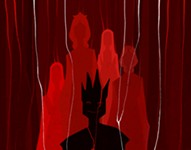Barbara Smith Conrad
A diva's return, triumphant
By Robert Faires, Fri., Jan. 30, 2009

With the inauguration of our 44th president, the observation that much has changed for African-Americans in the past 50 years has been repeated so often that it's almost lost meaning. But if you want to know just how much has changed for African-Americans in that time, what things were like for them a half-century ago, ask Barbara Smith Conrad. She lived it. And right here in our town.
The celebrated mezzo-soprano was among the first 104 African-American undergraduates to be admitted to the University of Texas in the 1950s. Only 16 years old at the time, Barbara Smith had made her way to Austin from the tiny crossroads of Center Point, deep in the East Texas Piney Woods. Her youth and rural upbringing notwithstanding, Smith's remarkable voice earned her recognition, and in 1956, she was cast as the female lead in the School of Music production of Henry Purcell's opera Dido and Aeneas. But the male student cast opposite her was white, and a cross-racial romance – even on stage – generated controversy. Smith received threats to her safety, and state legislators put the screws to UT President Logan Wilson, warning of cuts in funding if Smith wasn't removed from the cast. So two weeks before Dido and Aeneas was to open, College of Fine Arts Dean E. William Doty told Smith she would not appear in the opera. That prompted The Daily Texan to run a front-page story headlined "Negro Girl Withdrawn From UT Opera Cast" two days before the show's opening. Students rose up in Smith's defense, protesting her removal from the opera with a petition that collected 1,500 names. National news outlets picked up the story, bringing Sidney Poitier and Eleanor Roosevelt, among others, to voice support for Smith. Harry Belafonte called her personally and offered to underwrite her studies at another university, but Smith chose to stay at UT, where she earned her Bachelor of Music in 1959.
She went on to an international singing career and renown as Barbara Smith Conrad (adding her father's first name to her own on learning that Actors' Equity had a Barbara Smith on its rolls), but because of her experiences, Smith remained distant from UT for 25 years. An olive branch extended by UT President Peter Flawn in 1984 managed to bring her back into the burnt-orange fold, and she has since performed in Earl Stewart's opera Al-Inkishafi here; become an artistic adviser and ambassador for the American Spirituals Initiative at the Briscoe Center for American History, which is currently producing the documentary When I Rise: The Story of Barbara Smith Conrad; been named a distinguished alumna; and had a Presidential Scholarship endowed in her name.
Conrad's ties to Austin grow tighter again this week through a series of concerts and master classes, plus recognition from – get this – the same body that essentially kept her from playing Dido 50 years ago, the Texas Legislature. The Lege making amends – now that's change.
Conrad's appearances are as follows:
Friday, Jan. 30: Conrad narrates Joseph Schwantner's "Daybreak of Freedom" at the World of Sound concert, Bass Concert Hall.
Monday-Friday, Feb. 2-6: Conrad teaches master classes in opera, the Butler School of Music.
Tuesday, Feb. 3: The Carver Museum and Cultural Center hosts An Evening With Barbara Conrad.
Wednesday, Feb. 4: Conrad performs Intimate Reflections: In Celebration of My Journey Here, a concert of spirituals, at Bates Recital Hall.
Thursday, Feb. 5: Conrad is recognized with a resolution by both houses of the Texas Legislature and sings in the Capitol Rotunda.
Saturday, Feb. 7: Conrad serves as master of ceremonies for the Black History Concert, Bates Recital Hall.
For more information, call 471-5401 or visit www.music.utexas.edu.










